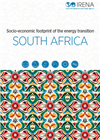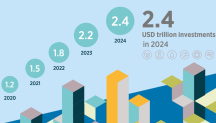

-
-
IRENA (2023), Socio-economic footprint of the energy transition: South Africa, International Renewable Energy Agency, Abu Dhabi.
Copied
https://www.irena.org/-/media/Files/IRENA/Agency/Publication/2023/Nov/IRENA_Socio-economic_footprint_South_Africa_2023.pdf
Copied
Socio-economic footprint of the energy transition: South Africa
Newsletter
Over the past ten years, the Republic of South Africa’s economy has grown by approximately 1% per year, and unemployment reached 34.9% at the end of September 2021. As a result, poverty rates have risen to levels not seen for more than a decade, reversing years of progress.
The impacts of climate change have exacerbated existing poverty and inequality in South Africa. Low-income households are disproportionately affected, as they are more exposed to pollution and extreme weather events, have limited access to quality public health services, and possess fewer financial resources to cope with related damage.
In 2021, South Africa updated its 2015 Nationally Determined Contribution (NDC) to the Paris Agreement, adopting a bolder decarbonisation pathway and reducing the upper range target of emissions by 17% for 2025 and 32% for 2030.
To support energy transition planning and informed policy making in South Africa, this report builds on the analysis presented in IRENA’s World Energy Transitions Outlook by exploring the potential socio-economic impacts of the energy transition under two scenarios – the IRENA 1.5°C Scenario and the Planned Energy Scenario (PES).
Under the 1.5°C Scenario, South Africa’s GDP is expected to grow by an additional 7.8% per year, on average, over the 2021-2050 period when compared with the PES, resulting in substantial economic gains. Furthermore, employment is expected to grow by an additional 0.2% per year under the IRENA 1.5°C Scenario over the same period, compared to the PES. In the energy sector, the number of jobs remains steady at around 1 million under the 1.5°C Scenario, whilst overall welfare improves by more than 99.8%.
However, for these benefits to be realised, South Africa will require a comprehensive policy framework that not only drives forward the energy transition but also protects people, livelihoods and jobs.




